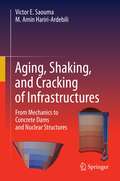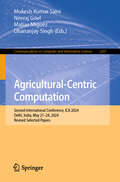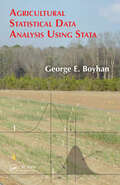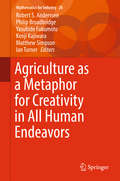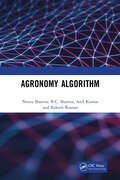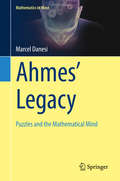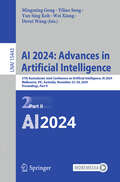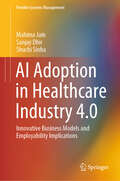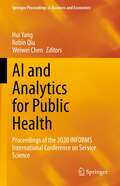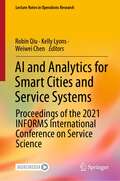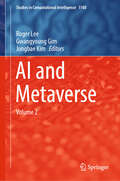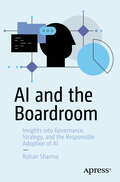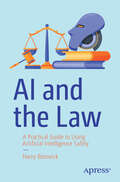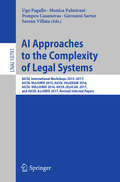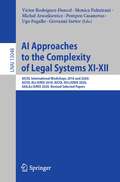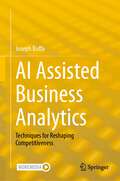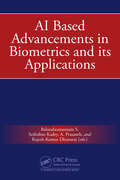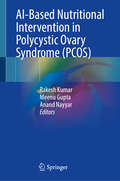- Table View
- List View
Aging in Hong Kong: A Comparative Perspective (International Perspectives on Aging #5)
by Jean WooWith the longest life expectancy for men and the second longest for women, Hong Kong typifies our planet's aging population. The daily lives of its older adults closely match the advantages and disadvantages experienced by urban elders in other developed countries. For these reasons, Hong Kong's elderly serve as a salient guide to older people's social, psychological, and healthcare needs--concerns of increasing importance as the world grows older. Aging in Hong Kong examines this emblematic population as a case study specifically in comparison with their counterparts in the West, shedding light on diverse, interrelated currents in the aging experience. Referencing numerous international studies, the book contrasts different health service arrangements and social factors and relates them to a variety of health outcomes. Its wide-ranging coverage documents health and illness trends, reviews age-friendly policy initiatives, relates health literacy to patients' active role in their own care, and discusses elders as an underserved group in the division of limited health funding and resources. This multiple focus draws readers' attention to policies that need revisiting or retooling as chapters analyze major life areas including: Living environment.Retirement and post-retirement employment issues.Financial asset management.Health literacy regarding aging issues.Elder-positive service delivery models.Ageism in the prioritization of healthcare.End-of-life issues. By assembling such a wealth of data on its subject, Aging in Hong Kong puts ongoing challenges into clear focus for gerontologists, sociologists, health and cross-cultural psychologists, public health policymakers, and others involved in improving the quality of elders' lives.
Aging in Israel: Research, Policy and Practice
by Sara CarmelIn the twentieth century, all developed nations began to undergo unprecedented demographic changes, as their birth rates declined, and life expectancies increased significantly --an average of thirty years in less than a century. These developments have caused major transformations in the composition of populations in these countries, especially in terms of the proportions of the various age groups. While the age groups of children and adolescents have decreased, those of elderly persons aged 65 and over, have increased.Consistent with the situation in other developed nations, the absolute number and percentage of elderly persons in the Israeli population is increasing, while the percentage of younger persons is decreasing. Israel, however, differs from other developed countries in the pace of this demographic change, the composition of its population, and the ways it can address needs related to aging. The demographic figures in Israel indicate that not only is the proportion of elderly persons in the total population growing, but that the old population itself is rapidly aging as well.This volume exemplifies how social science research can promote knowledge about and understanding of needs and opportunities for adaptation, and assist in evaluating the outcomes of policies and services on the personal, community and national levels, as well as suggest required changes. The variety of topics covered in this volume on age-related research, policies and practice reflects a wide range of research by Israeli scholars on social aspects of aging. Their research offers a glimpse into the knowledge base that has been built over the years on the aging process in Israel, the population of elderly people, and the national policies and network of services for the aged. Other developed countries with aging populations have much to learn from the Israeli experience.
Aging in Sub-Saharan Africa: Recommendation for Furthering Research
by National Research Council of the National AcademiesIn sub-Saharan Africa, older people make up a relatively small fraction of the total population and are supported primarily by family and other kinship networks. They have traditionally been viewed as repositories of information and wisdom, and are critical pillars of the community but as the HIV/AIDS pandemic destroys family systems, the elderly increasingly have to deal with the loss of their own support while absorbing the additional responsibilities of caring for their orphaned grandchildren. Aging in Sub-Saharan Africa explores ways to promote U.S. research interests and to augment the sub-Saharan governments' capacity to address the many challenges posed by population aging. Five major themes are explored in the book such as the need for a basic definition of "older person," the need for national governments to invest more in basic research and the coordination of data collection across countries, and the need for improved dialogue between local researchers and policy makers. This book makes three major recommendations: 1) the development of a research agenda 2) enhancing research opportunity and implementation and 3) the translation of research findings.
Aging, Shaking, and Cracking of Infrastructures: From Mechanics to Concrete Dams and Nuclear Structures
by Victor E. Saouma M. Amin Hariri-ArdebiliThis self-contained book focuses on the safety assessment of existing structures subjected to multi-hazard scenarios through advanced numerical methods. Whereas the focus is on concrete dams and nuclear containment structures, the presented methodologies can also be applied to other large-scale ones.The authors explains how aging and shaking ultimately lead to cracking, and how these complexities are compounded by their random nature. Nonlinear (static and transient) finite element analysis is hence integrated with both earthquake engineering and probabilistic methods to ultimately derive capacity or fragility curves through a rigorous safety assessment.Expanding its focus beyond design aspects or the state of the practice (i.e., codes), this book is composed of seven sections:Fundamentals: theoretical coverage of solid mechnics, plasticity, fracture mechanics, creep, seismology, dynamic analysis, probability and statisticsDamage: that can affect concrete structures, such as cracking of concrete, AAR, chloride ingress, and rebar corrosion,Finite Element: formulation for both linear and nonlinear analysis including stress, heat and fracture mechanics,Engineering Models: for soil/fluid-structure interaction, uncertainty quantification, probablilistic and random finite element analysis, machine learning, performance based earthquake engineering, ground motion intensity measures, seismic hazard analysis, capacity/fragility functions and damage indeces,Applications to dams through potential failure mode analyses, risk-informed decision making, deterministic and probabilistic examples,Applications to nuclear structures through modeling issues, aging management programs, critical review of some analyses,Other applications and case studies: massive RC structures and bridges, detailed assessment of a nuclear containment structure evaluation for license renewal. This book should inspire students, professionals and most importantly regulators to rigorously apply the most up to date scientific methods in the safety assessment of large concrete structures.
Aging with HIV in Sub-Saharan Africa: Health and Psychosocial Perspectives
by Mark Brennan-Ing Kristen E. Porter Jennifer E. Kaufman Catherine MacPhail Janet SeeleyWith the development of effective antiretroviral therapies (ART) in the mid-1990s, HIV became a treatable although serious condition, and people who are adherent to HIV medications can attain normal or near-normal life expectancies. Because of the success of ART, people 50 and older now make up a majority of people with HIV in high-income countries and other places where ART is accessible. The aging of the HIV epidemic is a global trend that is also being observed in low- and middle-income countries, including countries in sub-Saharan Africa, where the greatest number of older people with HIV reside (3.7 million). While globally over half of older adults with HIV are in sub-Saharan Africa, we have little information about the circumstances, needs, and resiliencies of this population, which limits our ability to craft effective policy and programmatic responses to aging with HIV in this region. At present, our understanding of HIV and aging is dominated by information from the U.S. and Western Europe, where the epidemiology of HIV and the infrastructure to provide social care are markedly different than in sub-Saharan Africa. Aging with HIV in Sub-Saharan Africa addresses this gap in our knowledge by providing current research and perspectives on a range of health and psychosocial topics concerning these older adults from across this region. This volume provides a unique and timely overview of growing older with HIV in a sub-Saharan African context, covering such topics as epidemiology, health and functioning, and social support, as well as policy and program implications to support those growing older with HIV. There are very few published volumes that address HIV and aging, and this is the first book to consider HIV and aging in sub-Saharan Africa. Most publications in this area focus on HIV and aging in Uganda and South Africa. This volume broadens the scope with contributions from authors working in West Africa, Botswana, and Kenya. The range of topics covered here will be useful to professionals in a range of disciplines including psychology, epidemiology, gerontology, sociology, health care, public health, and social work.
Agnesi to Zeno: Over 100 Vignettes From the History of Math
by Sanderson SmithAgnesi to Zeno: Over 100 Vignettes from the History of Math presents a series of vignettes that highlight developments in mathematical thought and achievement as they relate to human history. For the most part, the vignettes are chronologically arranged; topics that span long periods of time are placed strategically throughout the book.
Agricultural-Centric Computation: Second International Conference, ICA 2024, Delhi, India, May 21–24, 2024, Revised Selected Papers (Communications in Computer and Information Science #2207)
by Mukesh Kumar Saini Neeraj Goel Matias Miguez Dhananjay SinghThis book constitutes the proceedings of the Second International Conference on Agricultural-Centric Computation, ICA 2024, held in Delhi, India, during May 21–24, 2024. The 20 full papers and 6 short papers included in this book were carefully reviewed and selected from 79 submissions. This year's conference focuses on how advanced computational techniques can address critical issues in the agricultural sector, such as climate resilience, food security, sustainable practices, biodiversity conservation, soil health, water management, and market access.
Agricultural Statistical Data Analysis Using Stata
by George BoyhanPractical statistics is a powerful tool used frequently by agricultural researchers and graduate students involved in investigating experimental design and analysis. One of the most widely used statistical analysis software packages for this purpose is Stata. The Stata software program has matured into a user-friendly environment with a wide variet
Agriculture as a Metaphor for Creativity in All Human Endeavors (Mathematics For Industry #28)
by Philip Broadbridge Yasuhide Fukumoto Robert S. Anderssen Kenji Kajiwara Matthew Simpson Ian TurnerThis book is a collection of papers presented at the 'Forum 'Math-for-Industry' 2016 ' (FMfl2016), held at Queensland University of Technology, Brisbane, Australia, on November 21–23, 2016. <P><P>The theme for this unique and important event was “Agriculture as a Metaphor for Creativity in All Human Endeavors”, and it brought together leading international mathematicians and active researchers from universities and industry to discuss current challenging topics and to promote interactive collaborations between mathematics and industry. <P><P> The success of agricultural practice relies fundamentally on its interconnections with and dependence on biology and the environment. Both play essential roles, including the biological adaption to cope with environmental challenges of biotic and abiotic stress and global warming. The book highlights the development of mathematics within this framework that successful agricultural practice depends upon and exploits.
Agronomy Algorithm
by Neetu Sharma B.C. Sharma Anil Kumar Rakesh KumarAlgorithim (mathematics) helps in understanding the direct and indirect relationship of plants that exist within it and other environmental factors. This book helps to understand how yield is related to different growth parameters, how growth is influenced by different environmental phenomenon, how best the resources can be used for crop production, etc. The numerical examples in the book guide a student to coordinate the different parameters and understand the subject of Agronomy well. This book is divided into thirteen chapters and covers comprehensively the different agronomic aspects to understand the science of mathematical Agronomy to meet the current and future challenges related to cropping practices.
Ahead of the Curve: Inside the Baseball Revolution
by Brian KennyBrian Kenny--outspoken MLB Network host and commentator--uses stories from baseball's present and past to examine why we sometimes choose ignorance over information, and how tradition can trump logic, even when directly contradicted by evidence.Forget batting average. Kill the "Win." Say goodbye to starting pitchers. And please, please stop bunting. In Ahead of the Curve, Brian Kenny shows how baseball has been revolutionized--not destroyed--by analytical thinking. Most people who resist logical thought in baseball preach "tradition" and "respecting the game." But many of baseball's traditions go back to the nineteenth century, when the pitcher's job was to provide the batter with a ball he could hit and fielders played without gloves. Instead of fearing change, Brian Kenny wants fans to think critically, reject outmoded groupthink, and embrace the changes that have come with the "sabermetric era." In his entertaining and enlightening book, Kenny discusses why the pitching win-loss record, the Triple Crown, fielding errors, and so-called battling titles should be ignored. He also points out how fossilized sportswriters have been electing the wrong MVP's and ignoring legitimate candidates for the Hall of Fame; why managers are hired based on their looks; and how the most important position in baseball may just be "Director of Decision Sciences." Ahead of the Curve debunks the old way of analyzing baseball and ushers in a new era of straightforward logic. Illustrated with unique anecdotes from those who have reshaped the game, it's a must-read for fans, players, managers, and fantasy enthusiasts. A fresh, fascinating analysis of baseball, Ahead of the Curve will deepen every reader's appreciation of the game.
Ahmes’ Legacy: Puzzles And The Mathematical Mind (Mathematics in Mind)
by Marcel DanesiThis book looks at classic puzzles from the perspective of their structures and what they tell us about the brain. It uses the work on the neuroscience of mathematics from Dehaene, Butterworth, Lakoff, Núñez, and many others as a lens to understand the ways in which puzzles reflect imaginative processes blended with rational ones. The book is not about recreational or puzzle-based mathematics in and of itself but rather about what the classic puzzles tell us about the mathematical imagination and its impact on the discipline. It delves into the history of classic math puzzles, deconstructing their raison d’être and describing their psychological features, so that their nature can be fleshed out in order to help understand the mathematical mind.This volume is the first monographic treatment of the psychological nature of puzzles in mathematics. With its user-friendly technical level of discussion, it is of interest to both general readers and those who engage in the disciplines of mathematics, psychology, neuroscience, and/or anthropology. It is also ideal as a textbook source for courses in recreational mathematics, or as reference material in introductory college math courses.
AI 2024: 37th Australasian Joint Conference on Artificial Intelligence, AI 2024, Melbourne, VIC, Australia, November 25–29, 2024, Proceedings, Part II (Lecture Notes in Computer Science #15443)
by Mingming Gong Yiliao Song Yun Sing Koh Wei Xiang Derui WangThis two-volume set LNAI 15442-15443 constitutes the refereed proceedings of the 37th Australasian Joint Conference on Artificial Intelligence, AI 2024, held in Melbourne, VIC, Australia, during November 25-29, 2024. The 59 full papers presented together with 3 short papers were carefully reviewed and selected from 108 submissions. Part 1: Knowledge Representation and NLP; Trustworthy and Explainable AI; Machine Learning and Data Mining. Part 2: Reinforcement Learning and Robotics; Learning Algorithms; Computer Vision; AI for Healthcare.
AI 2024: 37th Australasian Joint Conference on Artificial Intelligence, AI 2024, Melbourne, VIC, Australia, November 25–29, 2024, Proceedings, Part I (Lecture Notes in Computer Science #15442)
by Mingming Gong Yiliao Song Yun Sing Koh Wei Xiang Derui WangThis two-volume set LNAI 15442-15443 constitutes the refereed proceedings of the 37th Australasian Joint Conference on Artificial Intelligence, AI 2024, held in Melbourne, VIC, Australia, during November 25-29, 2024. The 59 full papers presented together with 3 short papers were carefully reviewed and selected from 108 submissions. Part 1: Knowledge Representation and NLP; Trustworthy and Explainable AI; Machine Learning and Data Mining. Part 2: Reinforcement Learning and Robotics; Learning Algorithms; Computer Vision; AI for Healthcare.
AI Adoption in Healthcare Industry 4.0: Innovative Business Models and Employability Implications (Flexible Systems Management)
by Sanjay Dhir Shuchi Sinha Mahima JainThis book focuses on the prominent innovative business models and employability implications of artificial intelligence in the healthcare industry 4.0. To do so, it draws upon a rich base of case studies from robotics, virtual assistants, precision medicine, etc., to highlight the possibilities and implications of AI on health care. The book is useful in a variety of ways to the different stakeholders of healthcare sector. It helps medical professionals to understand the impact of the present technologies being adopted and the potential of AI-based technology. The content is of use for the policy makers as it also highlights the managerial and research implications, challenges, opportunities posed by the adoption of AI in healthcare industry 4.0. The rich case study analysis in the area of adoption of AI in healthcare helps generate insights for the academicians and researchers of this field in terms of the parallels drawn between adoptions of AI in healthcare industry 4.0 across the world. It is also useful for management students to understand the key management perspective when healthcare organizations attempt to devise strategies/policies for adoption of AI-driven technologies and processes implementation.
AI and Analytics for Public Health: Proceedings of the 2020 INFORMS International Conference on Service Science (Springer Proceedings in Business and Economics)
by Hui Yang Weiwei Chen Robin QiuThis volume offers the state-of-the-art research and developments in service science and related research, education and practice areas. It showcases emerging technology and applications in fields including healthcare, energy, finance, information technology, transportation, sports, logistics, and public services. Regardless of size and service, a service organization is a service system. Because of the socio-technical nature of a service system, a systems approach must be adopted to design, develop, and deliver services, aimed at meeting end users’ both utilitarian and socio-psychological needs. Effective understanding of service and service systems often requires combining multiple methods to consider how interactions of people, technology, organizations, and information create value under various conditions. Chapters highlight ways to approach such technical challenges in service science and are based on submissions from the 2020 INFORMS International Conference on Service Science.
AI and Analytics for Smart Cities and Service Systems: Proceedings of the 2021 INFORMS International Conference on Service Science (Lecture Notes in Operations Research)
by Robin Qiu Kelly Lyons Weiwei ChenThis book showcases state-of-the-art advances in service science and related fields of research, education, and practice. It presents emerging technologies and applications in contexts ranging from healthcare, energy, finance, and information technology to transportation, sports, logistics, and public services. Regardless of its size and service, every service organization is a service system. Due to the socio-technical nature of service systems, a systems approach must be adopted in order to design, develop and deliver services aimed at meeting end users’ utilitarian and socio-psychological needs alike. Understanding services and service systems often requires combining multiple methods to consider how interactions between people, technologies, organizations and information create value under various conditions. The papers in this volume highlight a host of ways to approach these challenges in service science and are based on submissions to the 2021 INFORMS Conference on Service Science.
AI and Metaverse: Volume 2 (Studies in Computational Intelligence #1160)
by Roger Lee Jongbae Kim Gwangyoung GimThe book reports the state-of-the-art results in Artificial Intelligence and Metaverse in both printed and electronic form. Studies in Computation Intelligence (SCI) has grown into the most comprehensive computational intelligence research forum available in the world. This book publishes original papers on both theory and practice that address foundations, state-of-the-art problems and solutions, and crucial challenges.
AI and the Boardroom: Insights into Governance, Strategy, and the Responsible Adoption of AI
by Rohan SharmaDevelop and implement AI strategies aligned with business goals, including operating models and partnership strategies. This book is practical guide for chief experience officers and other corporate board members faced with the complex issues of AI governance, data privacy, AI regulations, AI copyright, AI strategy, and more. Executives are eager to hear from other executives, peers, and authority figures regarding AI matters, and how to approach them quickly, correctly and meaningfully. The cost of missing out or messing up in AI transformation is easy so it’s imperative that C-suite and board members have the right mental framework to ask the right questions for their organizations. Throughout this book, you’ll see how to develop and execute AI strategies that align with your organizational goals and ethical standards. You’ll navigate the complex landscape of AI regulation and governance, applying best practices to ensure compliance and protect stakeholder interests. You’ll also, understand how to innovate and adapt AI technologies within your operations. AI and the Boardroom provides all the right tools to guide decision-making, foster partnerships, and enhance customer experiences What You Will Learn Master AI governance, regulations, and ethical considerations, including privacy and intellectual property issues. Optimize AI investments, budgets, and ROI through effective KPIs, OKRs, and risk management. Navigate organizational changes brought by AI, including executive compensation, team structures, and change management. Leverage AI for board-level decision-making while advancing organizational AI maturity and staying ahead of emerging trends. Who This Book Is For Suite executives and corporate board members; technology and innovation leaders; risk management and compliance professionals; corporate strategists and business unit leaders; AI program managers and data scientists
AI and the Law: A Practical Guide to Using Artificial Intelligence Safely
by Harry BorovickLearn how to maximize your use of, and benefit from AI, personally and professionally while staying safe. To satisfy professionals and businesses trying to modernize their approaches to work and personal tasks, this book will explain some of the basics of what AI is, what AI is likely to look like in the near future, and how not to get stung using it. You’ll quickly realize that AI isn’t coming, it’s here, along with its opportunities and challenges. While some of the advantages of using AI tools may seem too good to be true, you’ll discover that the key to navigating the early stages of the AI era is to understand its guiding principles and then to prioritize the guidelines. The book features general situations and use cases to help you experience AI for fun and for work while retaining the benefits, profits, creations, outputs, and efficiencies of it. If you’re going to use AI in your daily career, whether as a student, creative, executive, marketer or in sales this book will help you understand how to bypass obstacles and get value from AI with the guidance of an AI and tech lawyer. What You Will Learn Identify, debunk, and protect against business and legal risk in the AI eraDiscuss these issues on a high level with CTOs and COOsSee how professionals can mutually use AI to their benefit Who This Book is For Anyone who wants to know whether AI is really going to change the world through the lens of their industry, or to simply understand how AI can be safely harnessed to maximize daily value while minimizing practical risks.
AI Approaches to the Complexity of Legal Systems: International Workshops Aicol-i/ivr-xxiv, Beijing, China, September 19, 2009 And Aicol-ii/jurix 2009, Rotterdam, The Netherlands, December 16, 2009 Revised Selected Papers (Lecture Notes in Computer Science #6237)
by Ugo Pagallo Monica Palmirani Pompeu Casanovas Giovanni Sartor Serena VillataThis book includes revised selected papers from five International Workshops on Artificial Intelligence Approaches to the Complexity of Legal Systems, AICOL VI to AICOL X, held during 2015-2017: AICOL VI in Braga, Portugal, in December 2015 as part of JURIX 2015; AICOL VII at EKAW 2016 in Bologna, Italy, in November 2016; AICOL VIII in Sophia Antipolis, France, in December 2016; AICOL IX at ICAIL 2017 in London, UK, in June 2017; and AICOL X as part of JURIX 2017 in Luxembourg, in December 2017.The 37 revised full papers included in this volume were carefully reviewed and selected form 69 submissions. They represent a comprehensive picture of the state of the art in legal informatics. The papers are organized in six main sections: legal philosophy, conceptual analysis, and epistemic approaches; rules and norms analysis and representation;legal vocabularies and natural language processing; legal ontologies and semantic annotation; legal argumentation; and courts, adjudication and dispute resolution.
AI Approaches to the Complexity of Legal Systems XI-XII: AICOL International Workshops 2018 and 2020: AICOL-XI@JURIX 2018, AICOL-XII@JURIX 2020, XAILA@JURIX 2020, Revised Selected Papers (Lecture Notes in Computer Science #13048)
by Víctor Rodríguez-Doncel Monica Palmirani Michał Araszkiewicz Pompeu Casanovas Ugo Pagallo Giovanni SartorThis book includes revised selected papers from the International Workshops on AI Approaches to the Complexity of Legal Systems, AICOL-XI@JURIX2018, held in Groningen, The Netherlands, on December 12, 2018; AICOL-XII@JURIX 2020, held in Brno, Czechia, on December 9, 2020; XAILA@JURIX 2020, held in in Brno, Czechia, on December 9, 2020.*The 17 full and 4 short papers included in this volume were carefully reviewed and selected form 39 submissions. They represent a comprehensive picture of the state of the art in legal informatics. The papers are logically organized in 5 blocks: Knowledge Representation; Logic, rules, and reasoning; Explainable AI in Law and Ethics; Law as Web of linked Data and the Rule of Law; Data protection and Privacy Modelling and Reasoning.*Due to the Covid-19 pandemic AICOL-XII@JURIX 2020 and XAILA@JURIX 2020 were held virtually.
AI Assisted Business Analytics: Techniques for Reshaping Competitiveness
by Joseph BoffaThe primary path to success, is to use software designed to sample and analyze cashflow and then link that analysis, with forecasting and market research. The case study will start with a small business income statement indicating a cashflow problem. The analysis that follows will be a comprehensive statistical approach of fiscal management. The case study will provide an overview of the total process of controlling and analyzing cashflow. Business prosperity depends on: 1- Staying in touch with cashflow by means of regular statistical audits2- Transition to statistical methods for forecasting future cashflow3- Link cashflow with customer perception and satisfaction The book is intended for courses with prerequisites that the student has a knowledge of accounting and is comfortable in using Excel. It uses professional Excel with its Analytics Toolkit. Complete knowledge of the Toolkit is not a prerequisite since the book will adequately cover the relevant analytic tools. There is no need for separate statistical software such as SPSS or SAS. The book is intended for intermediate/advanced college level courses in business financial methods and control.
AI Based Advancements in Biometrics and its Applications
by S Balasubramaniam Seifedine Kadry A. Prasanth Rajesh Kumar DhanarajThis book delves into the history of biometrics, the different systems that have been developed to date, problems that have arisen from these systems, the necessity of AI-based biometrics systems, different AI techniques developed to date (including machine learning, deep learning, natural language processing, and pattern recognition), their potential uses and applications, security and privacy issues in AI-based Biometric systems, current trends in AI-based biometrics, and presents case studies of AI-based biometrics.
AI-Based Nutritional Intervention in Polycystic Ovary Syndrome (PCOS)
by Rakesh Kumar Meenu Gupta Anand NayyarThis book provides an overview of AI-powered nutritional interventions for the management of Polycystic Ovary Syndrome (PCOS). It focuses on AI-driven diagnostics for swift and accurate PCOS identification, personalized nutrition plans integrating genetic and hormonal data, and behavioral interventions promoting adherence. The book bridges the gap between technological innovation and clinical practice, leading to a new era of precision medicine in women's health. Chapters cover information from AI-tailored nutrition plans to suit individual PCOS profiles to insights into micronutrients, macronutrients, and dietary choices. They also address glycemic control, hormonal balance, and holistic wellness. Further chapters cover the ethical dimensions of AI in healthcare while championing patient empowerment. It also provides real-time monitoring through wearable tech and ethical considerations surrounding AI implementation in healthcare. The book includes real-life success stories, case studies, and practical guidance to aid decision-making. The book is relevant for healthcare professionals, gynecologists, nutritionists, and researchers to harness artificial intelligence’s potential in optimizing women's health and well-being.



